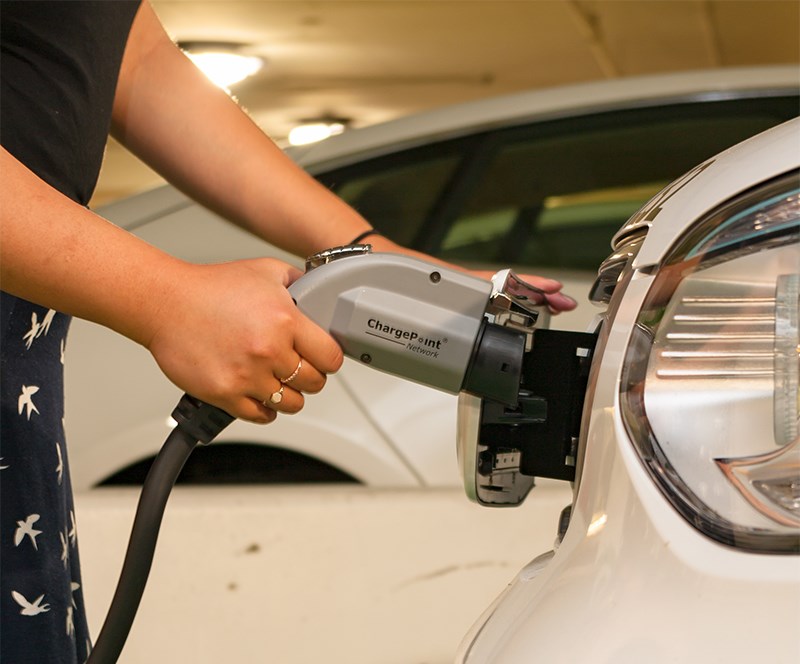A Port Coquitlam proposal to require basic electric vehicle (EV) infrastructure in new homes could spur more people to make the switch from gas-powered cars, predicts an agency raising awareness about electric vehicles in B.C.
“Access to home charging is one of the key indicators on whether someone chooses to go electric,” said Charlotte Argue, program manager for climate change and air quality for Plug In BC.
Tuesday at 7 p.m., PoCo will hold a public hearing in council chambers on a proposed bylaw that would require developers to rough in electrical infrastructure for a Level 2 EV charging station in parking lots for houses, townhouses and apartment buildings.
According to Argue, most people prefer Level 2 because it charges car batteries more quickly then a standard 120 volt plug, and putting in the wiring when homes are built would make installing a charging station later cheaper and more accessible.
Retrofitting an existing building for a Level 2 charging station typically costs five times more than roughing-in the wiring during construction, according to the city of PoCo.
As well, Argue said retrofitting can be challenging, and she noted that strata councils sometimes oppose upgrades for one or two residents because of the costs or other reasons.
Electric vehicles have been slow to gain popularity in B.C. but drops in prices and more choice are having an effect, with sales doubling each year. By 2030, an estimated 24% to 27% of all cars sold will be EVs.
WHAT IT MEANS
If PoCo's proposed policy is approved, builders would have to ensure there is adequate electrical panel capacity as well as conduit and electrical boxes to accommodate Level 2 240-volt EV charging stations. The installation would be required for apartments and ground-oriented homes including single-family homes, duplexes, townhouses and row homes.
The requirement would mean infrastructure would be installed to ensure one space per unit has access to an EV outlet and for apartment buildings, up to eight parking spaces may share an outlet.
Argue said PoCo is one of several municipalities tackling the EV infrastructure issue for new home construction.
Plug In BC is trying to address the problem with financial incentives for stratas to install the EV charging stations and last year gave grants of up $4,500 to 115 apartments in Metro Vancouver for a total of $600,000. Funds came from the provincial government, Argue said, with 130 charging stations installed.
It is possible to charge a car with a standard 120 volt plug, known as “trickle charge,” and is best used when parked overnight or long term; a typical 120 volt plug in an older home could be adequate for commutes under 30 km a day. In comparison, a Level 2 can charge a car twice as quickly, Argue said.
“You don’t really have to worry about a fast charge,” she said, “it depends on your commute.” Argue added that the number of charging stations is growing in B.C. to help people making longer trips.
As for the costs, Argue said charging an EV car at a house would add about $400 more a year to the residents' electrical bill, “which is cheap compared to paying for fuel, which is closer to $2,600.”
More information about the different kinds of electric vehicles, incentives, where to charge your vehicle and other information, visit pluginbc.ca, which is a program of the Fraser Basin Council, and a collaboration between government, industry, academic institutions, EV owners, NGOs and utilities.
FAST FACTS
As of June, 2017, there were:
• 6,000 or more electric vehicles on the road in B.C.;
• 1,000 public charging stations across B.C.
• and 32 or more DC fast charging stations, with more planned.



